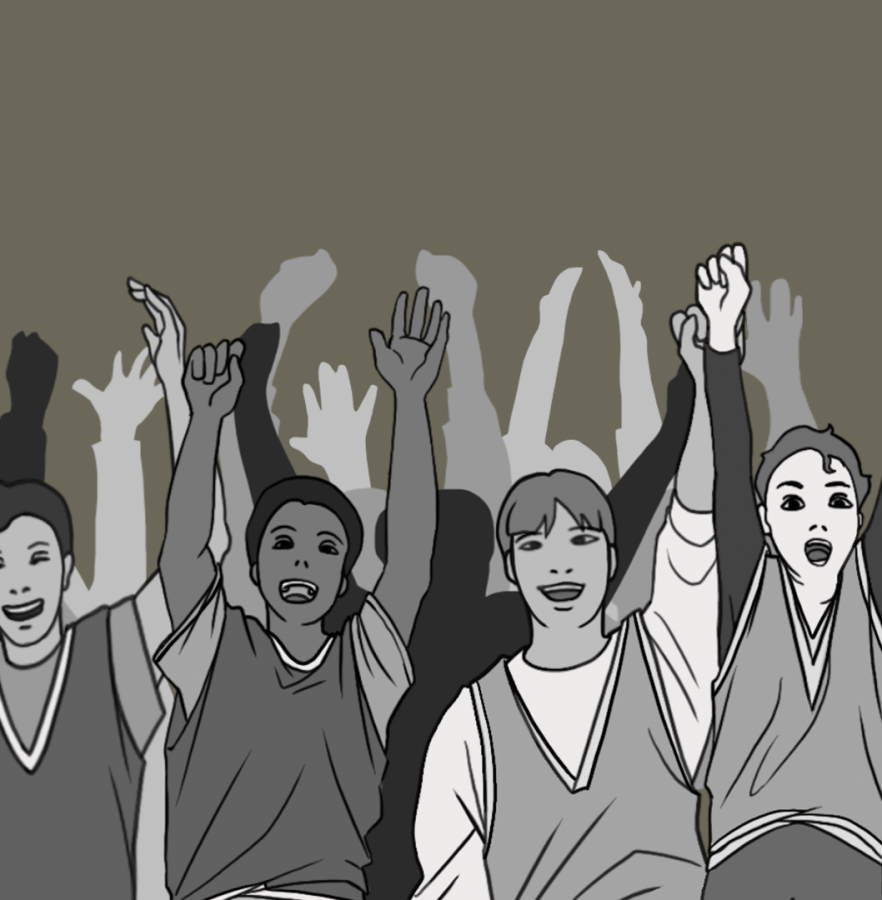Sports spark opportunities for human connection, transcend social barriers
According to a statistical study published in the book “Soccernomics” by economists Simon Kuper and Stefan Szymanski, the number of people who died by suicide in Europe each year decreased by an average of 682 people when their national soccer team played in a major tournament. One likely reason is that sports provide people who might otherwise be unsatisfied with their lives with an outlet for human connection and bonding. After all, one does not have to be especially charming or outgoing to cheer for their favorite sports team among other fans. Perhaps for most people, the stakes are lower than those of life and death presented in the “Soccernomics” study, but the immense social and emotional benefits of sports are still significant in improving many individuals’ lives. Playing or watching a sport can bring families, friends and even strangers closer together.
For senior Mackenzie Green, who does taekwondo with her two brothers, participating in her sport is an opportunity to grow closer to her family in a unique setting. “It really increases the sibling rivalry,” she said. “My brothers always push me, and that rivalry is part of the reason why it’s so competitive. But it’s also really nice to have someone there who understands how tough something is for you or how big of an accomplishment something was.”
The rigorous nature of taekwondo has also allowed Green to foster deeper appreciation for her sports community. During a three-day test to earn her black belt, Green had to perform a variety of challenging exercises, including running time trials and reaching a certain number of pushups and situps. “We all finished that test together,” she said. “So, while it was an individual thing where you were trying to improve yourself, being in a community like that was a really powerful experience. I was able to see that everyone made improvements and (that) everyone came far.”
Taekwondo is not the only major sport in Green’s life. Soccer also holds particular significance in her family history. “My dad is from England, so we’re a very soccer-oriented family,” she said. “My parents actually met playing soccer: They did a coed soccer team together. I’ve always grown up playing soccer, watching soccer or being exposed to soccer. It’s something that everyone in my family enjoys together. It’s something that we can all talk about or just enjoy in the same room.”
Televised soccer matches are often major events in Green’s household. “If it’s a team that we really like and they’re playing in a pretty big tournament, everyone in my family goes down and sits to watch the game on TV,” she said. “Everyone makes time for that—and we’re a very busy family, so that’s kind of impressive.”
While sports are a way for Green to bond with her family, playing lacrosse and football gives junior Joshua Kim an opportunity to form new connections, particularly after feeling isolated during the COVID-19 pandemic. “Especially in freshman year, it was really hard to socialize,” he said. “Playing sports really helps you build connections with people. You have shared common ground and spend so much time together. You go through games, losses and wins together.”
Similar to Green, Kim finds the built-in community of team sports one of the most valuable aspects of playing a sport. “When you lose a game or are going through tough times, you have all your teammates there because they’re going through the same (experiences) as you,” he said. “It doesn’t feel like you’re going through anything alone.”
Relationships forged between teammates have the potential to last beyond simply playing the sport together. Kim used to play soccer in elementary school with many teammates who now attend Palo Alto High School. “I stopped playing as I entered middle school, so I never saw them because they (didn’t go) to the same school as me,” he said. “Then, as I started meeting people from Paly again, it wasn’t awkward at all with the people I used to play soccer with. We’re able to go back and have conversations. We’re not building just relationships at the moment, but we’re building stuff that lasts because we have so many shared experiences together.”
One of Kim’s most memorable moments of connection comes from watching a Sunday football game in a sports bar with his family. “There was this guy sitting alone at one of the bar tables,” he said. “He looked really lonely, so I just sat down with him. The simple fact that we were both enjoying the game helped us talk, and it was a really cool experience because I got to talk not just about sports, but life stories as well. It was really interesting because you get to know people through sports that you would never talk to otherwise.”
Kim’s experience illustrates how sports’ widespread appeal helps people transcend the barriers that may exist outside of a match. “You don’t have to know these people, be the same age, go to the same school or have similar interests,” he said. “You’re able to connect with people you don’t know at all. It’s a universal language.”
Your donation will support the student journalists of Henry M. Gunn High School. Your contribution will allow us to purchase equipment and cover our annual website hosting costs.

On staff since January 2021, junior Carly Liao is a Forum editor for The Oracle. Outside of the newspaper, she enjoys running, doing crossword puzzles...


